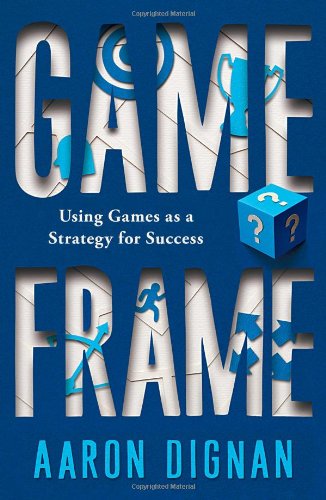- Home
- Articles
- Reviews
- About
- Archives
- Past Issues
- The eLearn Blog
Archives
| To leave a comment you must sign in. Please log in or create an ACM Account. Forgot your username or password? |
|
Create an ACM Account |

What if your business could be a game? This isn't exactly the point of Aaron Dignan's book, Game Frame, but it is the question that sticks with me after a second reading. Dignan opens his book with the assertion "boredom is everywhere, and it's the by-product of poorly structured systems." That line took me back to the first system training I ever developed. A moment I recall with clarity, when I first thought, "This isn't what I was born to do."
Dignan smartly avoids "gamification," a term that is quickly wearing out its buzzword welcome mat. Where I give Dignan a lot of credit is in his very practical focus on behavioral games and some very common-sense reasons why we need to start focusing more on games. He writes, "billions of people have grown up in a world surrounded by accelerating technological change. The obvious question is: what has it done to us? �What this force of change did was provide us with a constant stream of new things to play with."
Consider the average American born after 1970 has played 10,000 hours of computer and video games by the time they turn 21. Dignan addresses: "It's no wonder we have a culture of gamers who are obsessed with leveling up in every aspect of their lives. We all want to believe we're above average, and if we can somehow raise our profile, that belief is justified."
Multiple generations, starting with my own, are habituated into the notion that we are destined for something bigger. Games provide immediate quantitative and qualitative feedback on our performance—the kind of feedback most of the tasking in corporate America lacks. While corporate America has this gap, other organizations in the U.S. are masters at providing this kind of feedback with the specific purpose of developing civic-minded adults.
I'm an Eagle Scout and it never dawned on me that for more than 100 years, the Boy Scouts have issued merit badges which turns "learning complex new skills into an acquisitive experience and a form of public achievement." Dignan asserts that collecting merit badges are achievements. Earning ranks (Star, Life, Eagle) are levels that are harder and harder to master—a system "built on top of a survival curriculum to facilitate learning and development, which puts substance behind it, making it far more valuable than compulsive collecting" of badges for their own sake.
It's this kind of "right between the eyes" insight Dignan provides in Game Frame that repeatedly won my expanded thinking on gamification. Dignan writes with light and clear language imbued with common sense and an insight that belies his youth and depth. It only takes but a few hours to fully consume this book, and it is a good platform for ideas I plan to investigate with my own work. It should be the next book you read.
Aaron is the Chief Learning Officer of his consultancy, Problem Solutions. In this capacity, Aaron is the Community Manager for Advanced Distributed Learning (ADL), an applied research and development initiative through the U.S. Department of Defense, innovating a next generation of advanced, broad application learning technologies. He blogs at aaronsilvers.com and can be found on Twitter as @aaronesilvers.
|
To leave a comment you must sign in. |
|
Create an ACM Account. |